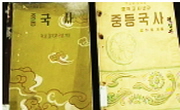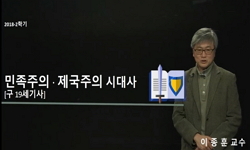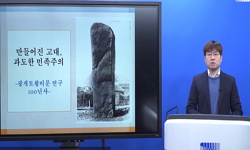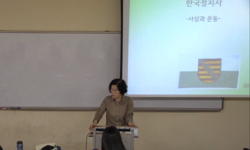한국과 일본은 지리적 조건으로 인해 역사를 공유할 수 있는 시기가 많았다. 그러나 근대 일본에 의한 조선침략과 식민지 지배는 양국 관계를 회복시키기 힘들 정도로 악화되고 상호 인식 ...
http://chineseinput.net/에서 pinyin(병음)방식으로 중국어를 변환할 수 있습니다.
변환된 중국어를 복사하여 사용하시면 됩니다.
- 中文 을 입력하시려면 zhongwen을 입력하시고 space를누르시면됩니다.
- 北京 을 입력하시려면 beijing을 입력하시고 space를 누르시면 됩니다.
日本歷史敎科書의 韓國史 歪曲 實態 分析 : 후소샤판 '새역사교과서'를 중심으로 = (An) Analysis of Twisted Contents on Korean History within the Japanese Textbook in History : Focus on the New Japanese History Textbook by Husoshya
한글로보기https://www.riss.kr/link?id=T10505136
- 저자
-
발행사항
부산 : 동의대학교 대학원, 2006
-
학위논문사항
학위논문(석사)-- 동의대학교 대학원 : 일어일문학과 2006. 2
-
발행연도
2006
-
작성언어
한국어
- 주제어
-
KDC
374.9911 판사항(4)
-
DDC
375.9951.9 판사항(21)
-
발행국(도시)
부산
-
형태사항
iv, 202p. : 삽도 ; 26cm
-
일반주기명
참고문헌: p. 184-200
- 소장기관
-
0
상세조회 -
0
다운로드
부가정보
국문 초록 (Abstract)
한국과 일본은 지리적 조건으로 인해 역사를 공유할 수 있는 시기가 많았다. 그러나 근대 일본에 의한 조선침략과 식민지 지배는 양국 관계를 회복시키기 힘들 정도로 악화되고 상호 인식 역시 자기중심적인 것이 될 수밖에 없었다. 이러한 인식은 두 나라의 歷史敎科書에도 그대로 반영되어 후세들에게 주입되어 왔다고 본다. 한국의 경우, 일본은 '가깝고도 먼 나라'로 인식되어 왔으며 식민주의 비판 교육에 의해 무의식적으로 일본을 싫어하고 증오의 대상으로 인식되어졌다. 일본 역시, 歷史敎育을 통해서 황국사관 중심의 역사적 우월성을 주입시킴으로써 오늘날과 같은 '歷史敎科書 歪曲 問題'가 발생하게 되었다고 생각한다.
최근의 '歷史敎科書 問題'는 왜곡의 정도와 그 주체가 정부, 사회 전반에 걸쳐 총체적이라는 데 심각성이 크다고 할 수 있다. 이러한 歷史敎科書의 출현은 1990년대에 들어서 일본 경제의 불황과 장기침체로 인한 미래에 대한 불안감과 맞물려 우익세력에 유리한 분위기가 형성되었으며, 맹목적인 애국심으로 단순화되어 편협한 민족주의로 나아가게 된 결과라고 본다. '새역모'의 이론적 토대가 된 '自由主義 史觀 運動'은 자국의 역사를 '自虐史觀'으로 규정하고 일본인의 입장에서 역사를 기술하자고 주장에서 비롯되었다. 또한 1990년대부터 불거진 '위안부' 문제가 교과서에 기술되고, 일본정부가 반성의 태도를 취하자 이에 불만을 표시하는 사회의 우경화 흐름을 의식한 정부가 출판사에 '보이지 않는 압력'을 행사한 점도 歷史敎科書 問題가 발생하게 된 배경이라 할 수 있을 것이다.
일본인의 韓國史 認識에 결정적 영향을 준 것은 皇國史觀으로 식민지 지배시기 동안 형성되었다. 日鮮同祖論, 停滯性論, 他律性論으로 대표되는 이들 사관은, 韓國史의 독자적 발전이나 주체성을 무시하는 것이었다. 이러한 戰前의 관점이 집필자는 물론 일본인 속에 내재되어 '새역사교과서'에도 영향을 미치고 있는 것이다.
이러한 배경아래 개악된 '새역사교과서'의 韓國史 관련 내용을 분석해 본 결과, 일본 학계에서조차 부정하는 세력이 많은 이른바 任那日本府說에 기초하고 있다는 점, 고대부터 현대까지 日本史의 우월성을 증명하는 비교 대상으로 韓國史를 폄하하고 있는 점, 일본에게 불리하거나 부정적인 사건의 원인 등에 대해서는 기술하지 않고 있는 점, 한국 등 타국에 입힌 피해를 축소 내지 은폐하고 있는 점, 식민지 지배에 대한 반성은 커녕 오히려 시혜를 베푼 것처럼 서술하고 있는 점, 일본 위주의 국가주의에 입각하여 외국과의 갈등 및 전쟁사를 위주로 서술하고 있는 점 등을 추출할 수 있었다.
결국 '새역사교과서'의 韓國觀은 여전히 '皇國史觀的'인 歷史認識을 관철하고 있고, 일본 국익 지상주의 관점에서 서술되고 있음을 알 수 있다. '歷史敎科書 問題'가 주는 역사적 의미는 '새역사교과서'가 일본사회가 겪고 있는 대내외적인 조건 변화에 따른 일본사회의 변화 요구를 부응한 것이라 볼 수 있으며, 이러한 변화가 우리나라에 끼칠 여러 가지 염려들을 대비하는 계기를 제공했다고 본다. 한편으로는 '우리 민족 제일주의'에 빠진 한국 國史敎科書와 歷史敎育을 되돌아보게 한 사건이었다.
앞으로의 대응은 우리의 역사와 문화를 국제적으로 널리 알릴 수 있는 상설기구를 설립하고, 감정적 대응의 반복보다는 설득력 있는 논리를 개발하여 적극적으로 대응할 필요가 있다고 본다. 또한 韓國史 및 韓日關係史 硏究를 지원하여 관련 전문가를 양성하여 중·장기적 안목에서 대처할 필요가 있을 것이다. 한·일 간 역사의 진정한 이해를 위해서는 문제가 역사적 사실이 아닌 해석의 차원에서 일어나고 있다는 점을 인정하고, 그것을 극복한 공동의 歷史認識이 어떻게 가능할 수 있는지를 고민하는 방향으로 전략을 바꾸어야 할 것이다. 한국과 일본 사이에는 기본적으로 특정 역사에 대한 사실 인식과 의미 해석의 차이가 있을 수밖에 없다는 현실을 인정하는 성숙한 歷史認識의 태도를 가짐으로써 진정한 동반적 관계로서의 역사발전이 가능할 것으로 생각한다.
다국어 초록 (Multilingual Abstract)
Due to the geological conditions, Korea and Japan had shared their culture and influenced each other's history in many aspects. However, Japan's invasion of Chosun dynasty and colonialization caused severe problems in their relationship and made them ...
Due to the geological conditions, Korea and Japan had shared their culture and influenced each other's history in many aspects. However, Japan's invasion of Chosun dynasty and colonialization caused severe problems in their relationship and made them hate each other. Since then, both countries have focused solely on their own history and tried to exclude the other's influence in their historical view.
Since Japanese colonial days, most Koreans have had negative feelings against Japanese and recognize them as 'a geologically close but emotionally far away country'. In addition, most Koreans believe that they are culturally superior to Japanese since they influenced many aspects of Japanese culture. Japanese also educate their students the distorted history encouraging them to believe that Japanese culture is far better than Korean one and influenced Korean since ancient times. This historical view caused Japanese to distort their history by teaching students with the perverted history textbook.
Recently, this problem has been more serious since the falsification of the historical descriptions of Japanese in some textbooks are led by Japanese government and leading societies. Japanese has the spirit of absolute loyalty toward their Emperor and the spirit of self-respect for their country. They are apt to disregard of the development of Korea independently. From these perspectives, the problem of the falsification of the history textbook should be issued in this contemporary history. The New history Textbook states that Japanese colonization over Koreans are authorized by Koreans and Japanese helped Koreans to be modernized and therefore Japanese history is always superior to Koreans. In addition to this, they try to avoid describing what they did to many Asian countries during the Second World War. They would rather emphasize their leading roles in Asian countries.
This historical view of Japanese which has been stated in the new history text book, seems to be derived from the current political problems and economic recessions. In some extents, this phenomenon gives an reflection to widely pervasive Koreans perception of nationalism so called 'we are the best in the world'.
Overall, Korea should establish fundamental systems, which help to publish Korean culture and history to the world and response Japanese argument not emotionally but logically in dealing with historical problems. To add this, it is necessary to build a History Research Team which includes both Korean and Japanese researchers and support it with long term perspective. For both countries, there should be matured historic recognitions and companionship in order to enhance their understandings of history between Japan and Korea.
목차 (Table of Contents)
- 요약 = ⅰ
- 목차 = ⅲ
- Ⅰ. 序論 = 1
- 1. 연구의 목적 = 1
- 2. 선행연구 = 4
- 요약 = ⅰ
- 목차 = ⅲ
- Ⅰ. 序論 = 1
- 1. 연구의 목적 = 1
- 2. 선행연구 = 4
- 3. 연구 내용 및 방법 = 7
- Ⅱ. 日本 歷史敎科書의 韓國史 歪曲 背景 = 10
- 1. '새역사교과서'의 民族主義 歷史觀 = 10
- 2. 日本 歷史敎科書 歪曲의 背景 = 20
- Ⅲ. 韓·日 歷史敎育의 目標 및 敎育課程 比較 = 45
- 1. 韓·日 양국의 歷史敎育 目標 = 45
- 2. 現行 韓·日 歷史 敎育科程 比較 = 51
- 3. 韓·日 敎科書 檢定制度 比較 = 62
- Ⅳ. '새역사교과서'의 韓國史 歪曲 實態 比較 分析 = 80
- 1. 古代 = 80
- 2. 中世 = 101
- 3. 近·現代史 = 114
- Ⅴ. 日本 歷史敎科書의 韓國史 歪曲의 問題點 = 164
- 1. '새역사교과서'의 韓國史 認識의 문제점 = 164
- 2. 후소샤판 '새역사교과서'의 문제점 = 167
- 3. 한·일 양국의 歷史觀 = 169
- Ⅵ. 結論 = 179
- 參考文獻 = 184
- Abstract = 201












